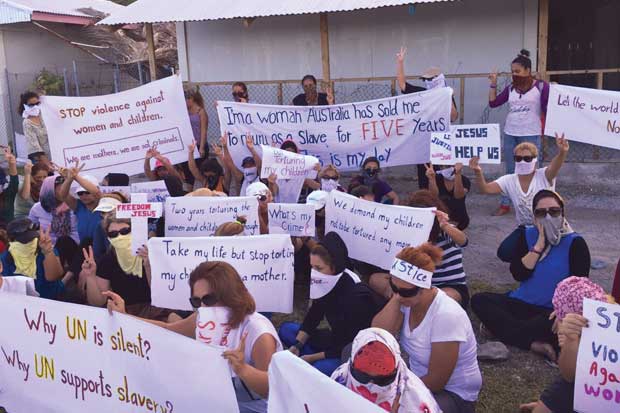A bill designed to increase the powers of officers in detention centres could allow the “death or serious injury” of asylum seekers despite the fact it is plagued by weak safeguards, vague definitions, and inadequate avenues of appeal, a Parliamentary Committee has been warned.
In a series of submissions legal groups and asylum seeker advocates have flagged a range of issues with the legislation, which a separate Committee has already found imperils a range of human rights.
The Migration Amendment (Maintaining the Good Order of Immigration Detention Facilities) Bill 2015 would allow an “authorised officer” to use “reasonable force” in order to protect life, property, or the health of an individual in an immigration detention centre. It also allows such force to be used to “maintain the good order, peace or security of an immigration detention facility”.
In a detailed submission, the UNSW based Kaldor Centre for International Refugee Law blasted the lack of safeguards in the bill.
“There is a risk that the powers could be used capriciously because the legislation does not contain a clear set of criteria about when force may be used, the degree of force that may be used, and how much consideration an officer must give to the consequences of his or her actions when using that force.”
Echoing the concerns raised by the Joint Parliamentary Committee on Human Rights, the Kaldor Centre submission raised the possibility the powers could be used against asylum seekers attempting to protest their detention.
“The range of instances to which the use of force provision applies is extremely broad and may be used to quash legitimate requests, dissent and protest,” it said.
“By affecting the ability of immigration detainees to engage in peaceful protest and communication, this provision may impermissibly burden the implied freedom of political communication.”
The bill has been broadly criticised for failing to define ‘reasonable’ force and moving the test of officer actions from objective to subjective criteria. An officer is allowed to use the high level of force so long as they form a reasonable belief it is necessary to prevent injury or maintain good order.
As private firm Serco is responsible for security in onshore detention centres it is likely its staff will form the bulk of the ‘authorised officers’.

Katie Robertson, an Associate at Maurice Blackburn’s social justice department, told New Maitilda she had grave concerns about the bill, which would potentially allow force to be used against children, and enabled circumstances in which asylum seekers could endure grievous bodily harm.
“The Bill is concerning for the manner in which it seeks to tip the power imbalance between asylum seekers and officers further towards the Commonwealth,” Robertson said.
Maurice Blackburn represents a range of asylum seeker clients, including babies born in detention centres but subject to offshore processing.
“Many of our clients already feel afraid to bring complaints against the Australian government for poor treatment or even harm suffered in detention,” Robertson said.
“[The bill] represents a further attempt by the government to extend their executive powers and limit the role of the judiciary, an institution essential for holding the government to account for its treatment of asylum seekers in immigration detention.”
When recommending the bill to the Parliament, Minister for Immigration Peter Dutton said a statutory complaints mechanism introduced by the legislation would prevent the use of force being abused.
“The amendments in this bill address issues arising from incidents at a number of immigration detention facilities, which highlighted uncertainty, on the part of the immigration detention service providers, as to when it may act when confronted with public order disturbances in immigration detention facilities,” he said.
The bill ensures asylum seekers will be able to lodge complaints to the Secretary of the Department of Immigration. However, it also grants the Secretary broad discretion to reject those complaints.
As long as the force is used in “good faith”, asylum seekers will not be able to sue the Commonwealth for compensation.
The Kaldor Centre’s submission said this was inconsistent with general practice at a state level, where individual officers were indemnified but the state could still be pursued.
A Joint Committee on Human Rights review of the legislation questioned the need to increase officer powers and warned the move would threaten the right of asylum seekers to humane treatment in detention and effective remedy, as well as “the right to life”.
Commonwealth and Immigration Ombudsman Colin Neave also made a brief submission, arguing the legislation should extend the right of officers to use force in transit between detention facilities.
“It is often the case that use of force, particularly in relations to restraint, is necessary in these circumstances,” Neave said.
Donate To New Matilda
New Matilda is a small, independent media outlet. We survive through reader contributions, and never losing a lawsuit. If you got something from this article, giving something back helps us to continue speaking truth to power. Every little bit counts.



